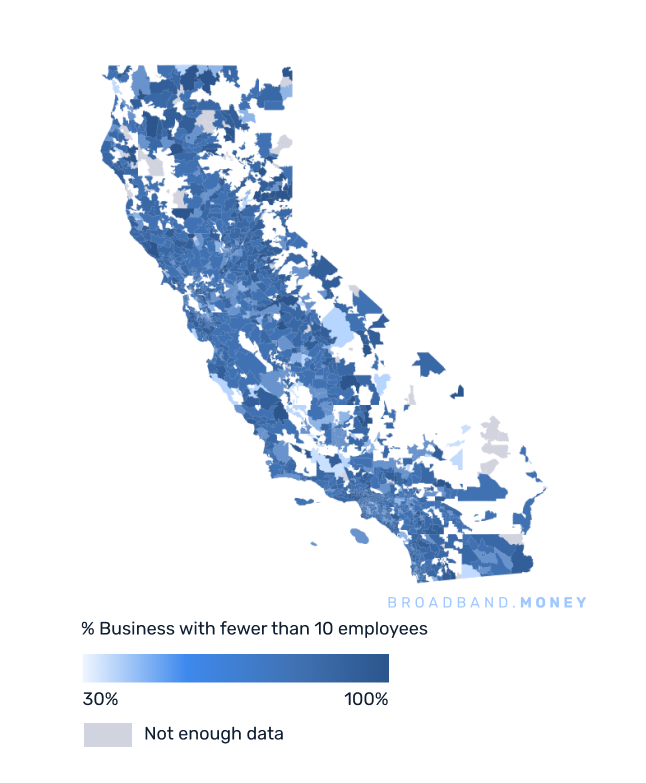Number of small business establishments

BEAD :$1.9 B
Treasury Capital Projects Fund: $540.2 M
Broadband Office Name:
Office of Broadband and Digital Literacy
Parent Department:
Department of Technology
California has been trying to close the digital divide since at least 2007. Still, many communities across the state still had a hard time accessing the Internet during the height of the coronavirus pandemic.
So the state is redoubling its efforts. Governor Gavin Newsom and the state legislature have embarked on a $6 billion infrastructure buildout over the next three fiscal years starting in 2021.
The $6 billion comes from a mixed funding stream coming from the state's general fund and from federal American Rescue Plan Act (ARPA) fiscal relief funds, according to the California Legislature's Legislative Analyst's Office (LAO.) The LAO has more details on the state's spending plans and timelines.
The California Public Utilities Commission is implementing the rules surrounding the roll-out of grants funded by federal infrastructure spending. The CPUC's proceedings can be followed here.
Newsom announced 18 middle mile projects in November 2021 as part of his broadband plan.
The CPUC created the California Advanced Services Fund (CASF) in 2007.
The goal was to facilitate broadband access to "unserved" and "underserved" areas of the state.
As of July 2020, the CPUC estimates that 490,413 Californians statewide lack access to the Internet with speeds of 25 Mbps x 3 Mbps.
That is the federal definition of broadband from the Federal Communications Commission. California's 2020 broadband plan states that its leaders defines “broadband” with “dual” definitions. "(1) a baseline definition to
match the FCC standard of 25/3 Mbps and (2) a goal of 100/20 Mbps that reflects the Governor’s Executive Order of a minimum of 100 Mbps download, and growing demand for higher upload speeds."
These are the working definitions when the state considers grants.
Broadband programs: California Advanced Services Fund (CASF): The California Advanced Services Fund provides grants to broadband service providers, public housing, broadband adoption entities, tribes, and regional consortia to help provide broadband infrastructure, service, and adoption in eligible areas.
The fund is allocated into multiple accounts:
Broadband Adoption Account: The Broadband Adoption Account provides $20 million in grants to increase publicly available or after school broadband access. Examples of grant uses include digital literacy training programs and public education to communities with limited broadband adoption.
Broadband Infrastructure Grant Account: The Broadband Infrastructure Grant Account is funded $560 million since 2008.
Rural and Urban Regional Broadband Consortia Grant Account: The CASF Consortia Grant Account funds grants to facilitate the deployment of broadband services by assisting infrastructure grant applicants in the project development or grant application process.
Line Extension Program: The Line Extension Program contains $5 million in grants to offset the costs of connecting to an existing or proposed facility-based broadband provide.
The Broadband Loan Loss Reserve Fund: The CPUC administers The Broadband Loan Loss Reserve Fund to fund the financing of the deployment of broadband infrastructure by a local government agency or nonprofit organization (Senate Bill 156, Public Utilities Code Section 281.2). The fund pays costs of debt issuance, obtaining credit enhancement, and establishing and funding of reserves for paying principal and interest on debt.
California Teleconnect Fund (CTF) Program: The California Teleconnect Fund provides participating entities a 50 percent discount for to broadband and communication services from participating service providers.
The California Emerging Technology Fund (CETF): The California Emerging Technology Fund provides an information hotline for details about affordable Internet – 1-844-841-INFO (4636).




